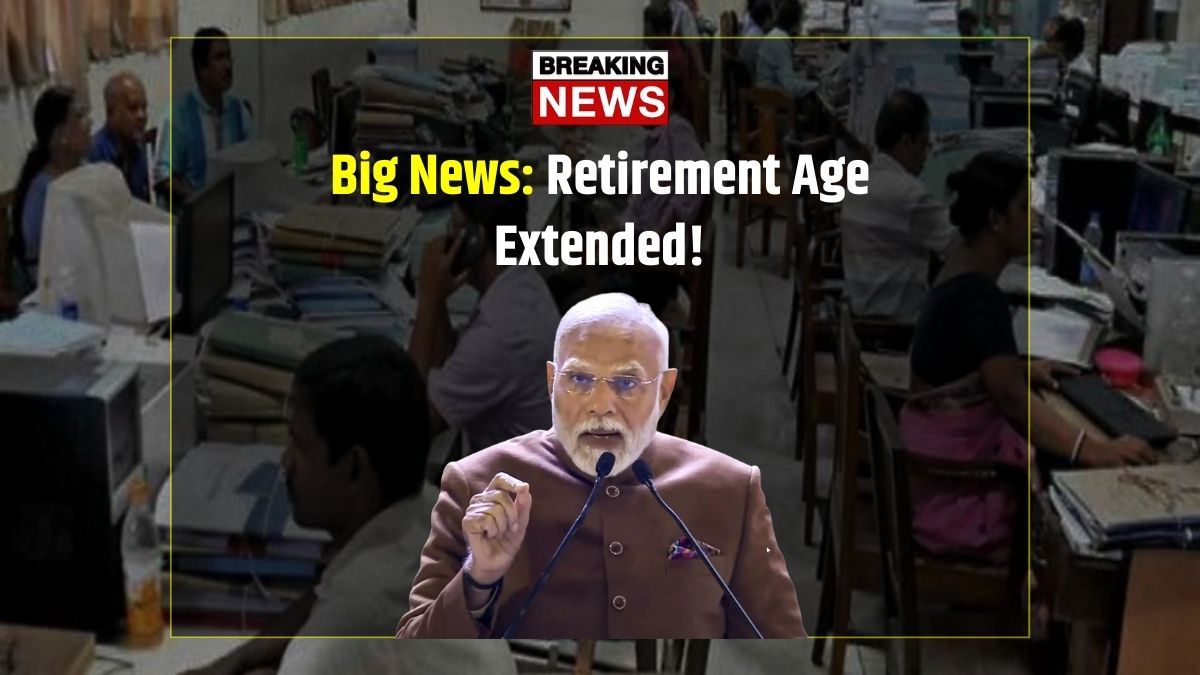Retirement Age Hike Confirmed – If you work in a government job or know someone who does, there’s a big update that’s going to impact lakhs of employees across India. The government has officially confirmed that it’s increasing the retirement age. Starting in the second half of 2025, central and some state government employees will be able to work for two more years, with the retirement age going up from 60 to 62.
This decision comes after months of discussions, committee reports, and talks with employee unions. The idea behind it is to retain experienced employees longer, reduce pension pressure, and improve the overall efficiency of public services.
What’s the New Rule?
Currently, government employees retire at the age of 60. But from late 2025, this age limit will be extended to 62 years for central government workers and some states that choose to adopt the policy. This means lakhs of employees will get two additional years in service, and that’s not just extra time at work it also means more income, better retirement benefits, and possibly even that long-awaited promotion.
How Will Employees Benefit?
The extension in retirement age is not just about staying longer in the job — there are real financial perks that come with it. Here’s how:
- 1. Bigger Pension:
Since pension is calculated based on the last drawn salary, staying two more years in service means a higher ending salary. That directly boosts the monthly pension amount after retirement. - 2. Higher Gratuity:
Gratuity is calculated based on years of service and last drawn salary. So two more years of service means more money as gratuity when you finally retire. - 3. Promotion Chances:
Many employees just miss out on promotions because of early retirement. With two more years added, there’s a strong chance that some employees could get one last promotion, which again boosts overall retirement benefits. - 4. More Savings:
It also means more time for savings and financial planning. Employees can continue to contribute to Provident Fund, NPS, or other retirement schemes for a longer period.
Why Did the Government Take This Step?
This change is part of a wider strategy. The government is working on revamping HR policies to make them more efficient and future-ready. Here are a few reasons behind the decision:
- People are living longer and healthier lives, so it makes sense to allow experienced professionals to work a little longer.
- In some sectors like healthcare, education, and engineering, there’s already a shortage of skilled workers.
- The pension load on the government is rising every year. Allowing employees to work longer helps reduce that pressure for the short term.
A number of expert committees and reports from employee unions also recommended this move, and it seems the government has finally acted on them.
What About New Job Aspirants?
While the decision has been welcomed by most current employees, not everyone is happy. Critics argue that increasing the retirement age might reduce job opportunities for the younger generation. Since older employees won’t retire as soon, there may be fewer openings in the short term.
However, the government says that recruitment for fresh candidates will not stop. It claims that hiring processes will continue independently of the retirement age change. In fact, the administration says it will balance the needs of both current employees and new job seekers.
What Should Employees Do Now?
If you’re close to 60 and working in the government sector, this update means you can now plan for two more years of active service. It’s a good time to revisit your retirement planning and financial goals. You might want to check how this extra time will impact your pension, gratuity, or even loan repayments.
For those preparing for government jobs, there may be some delays in openings for certain posts, but don’t lose hope. Hiring will go on, just possibly at a slower pace in some departments.
The retirement age for many government employees is set to rise from 60 to 62 starting from the second half of 2025. This move brings with it a range of benefits higher pension, increased gratuity, and more financial security but also raises questions about job opportunities for youth. The government, however, is confident that it can manage both aspects. If you’re a government employee, it’s a good time to reassess your career and retirement plans with this extra time in hand.




